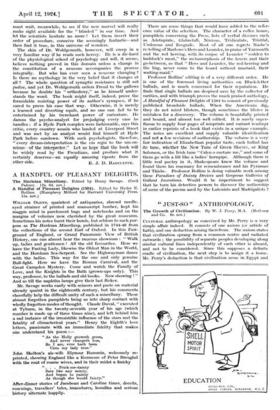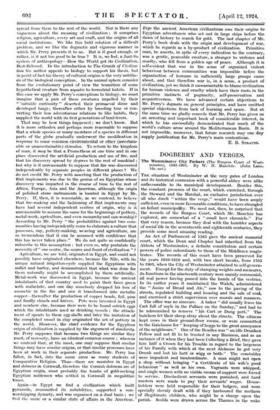" JUST-SO " ANTHROPOLOGY.
CULTURAL anthropology as conceived by Mr. Perry is a very simple affair indeed. It consists of one axiom (or article of faith), and one deduction arising therefrom. The axiom states that civilization sprang from a common centre and radiated outwards ; the possibility of separate peoples developing along similar cultural lines independently of each other is absurd, and not to be considered. Since this supposes a definite cradle of civilization, the next step is to assign it a home. Mr. Perry's deduction is that civilization arose in Egypt and
spread from there to the rest of the world. Nor is there any vagueness about the meaning of civilization ; it comprises religion, agriculture, every art and craft, and the origins of all social institutions. We like this bold solution of a difficult problem, and we like the dogmatic and vigorous manner in which Mr. Perry presents it to us. But is it good enough, or rather, is it not too good to be true ? It is, we feel, a Just-So system of anthropology—How the World got its Civilization, Best-Beloved. In the introduction to The Growth of Civiliza- tion the author appeals to biology to support his thesis, but in point of fact his theory of cultural origins is the very antithe- sis of the biological conception. In the animal sphere consider from the evolutionary point of view the transition of some hypothetical creature from aquatic to terrestrial habits. If in this case we apply Mr. Perry's conceptions to biology, we must imagine that a pair of these creatures impelled by their "'satiable curtiosity " deserted their primaeval slime and developed lungs ; thereafter either by breeding true or con- verting their less adventurous relations to like habits, they supplied the world with its first generations of land-livers.
That may be how things happened ; we don't know. But it is more orthodox and perhaps more reasonable to suppose that a whole species or many members of a species in different parts of the globe gradually underwent the modification in response to some common environmental or other (ascertain- able or unascertainable) stimulus. To return to the kingdom of man, it may be that a Prometheus at one time and in one place discovered the artificial production and use of fire, and that his discovery spread by degrees to the rest of mankind ; but why is it unreasonable to suppose that fire was discovered independently by separate peoples in different places ? We do not credit Mr. Perry with asserting that the production of flint implements was due to the genius of an Egyptian whose discovery was imparted in the course of time to the rest of Africa, Europe, Asia and the Americas, although the origin of polished stone instruments is located in Egypt by Mr. Perry. If, then, it is reasonable, as we contend, to believe that fire-making and the fashioning of flint implements may have had several independent centres of origin, why is it unreasonable to assume the same for the beginnings of pottery, metal-work, agriculture, and even monarchy and sun-worship? According to Mr. Perry " the probabilities against two com- munities having independently come to elaborate a culture that possesses, say, pottery-making, weaving and agriculture, are so tremendous that it can be assumed with confidence that this has never taken place." We do not quite so confidently subscribe to this assumption ; but even so, why postulate the necessity of " one centre, the source and fount of civilization " ?
Agriculture, we are told, originated in Egypt, and could not possibly have originated elsewhere, because the Nile, with its unique natural irrigation-cycle supplied the Egyptians with millet and barley, and demonstrated that what was done for them naturally might be accomplished by them artificially. Metal-work was discovered in Egypt, because the ancient inhabitants of that country used to paint their faces green with malachite, and one day somebody dropped his box of cosmetic in the fire and saw it transformed into metallic copper—thereafter the production of copper beads, foil, pins and finally chisels and knives. Pots were invented in Egypt and nowhere else, because there were to be found ostrich eggs which the inhabitants used as drinking ,vessels ; the attach- ment of spouts to these egg-shells and later the imitation of the completed vessel in clay originated the art of pottery in the world. However, the chief evidence for the Egyptian origin of civilization is supplied by the argument of similarity. Mr. Perry supposes that because two things are similar they must, of necessity, have an identical common source ; whereas we contend that, at the most, one may suppose that similar things may have similar origins, or that similar processes have been at work in their separate production. Mr. Perry has fallen, in fact, into the same error as many students of Comparative Religion. Thus—there are mastabas in Egypt and dolmens in Cornwall,,therefore the Cornish dolmens are of Egyptian origin, most probably the tombs of gold-seeking Egyptian noblemen who settled in Cornwall in megalithic times.
Again—in Egypt we find a civilization which built pyramids, mummified its notabilities, supported a sun- worshipping dynasty, and was organized on a dual basis ; we find the same or a similar state of affairs in the Americas. Ergo the ancient American civilizations owe their origins to Egyptian adventurers who set out in large ships before the dawn of history to search for gold. The last chapter of Mr. Perry's book deals with the origin and development of war, which he regards as a by-product of civilization. Primitive man, he asserts, in spite of every indication to the contrary, was a gentle, peaceable creature, a stranger to violence and cruelty, who fell from a golden age of peace. Although it is self-evident that war in the sense of organized violent behaviour between communities was impossible before the organization of humans in sufficiently large groups came about, and that therefore war is, in a sense, a product of civilization, yet we think it unwarrantable to blame civilization for human violence and cruelty which have their roots in the primitive instincts of pugnacity, self-preservation and acquisitiveness. We have advanced certain objections to Mr. Perry's dogmata on general principles, and have omitted special objections from lack of learning and space. But at the same time we gladly concede that Mr. Perry has given us an arresting and important book of considerable interest, in which he has successfully demonstrated that much of the world's culture arose around the Mediterranean Basin. It is not impossible, moreover, that future research may one day supply justification for Mr. Perry's main contentions.
E. B. STRAUSS.











































 Previous page
Previous page